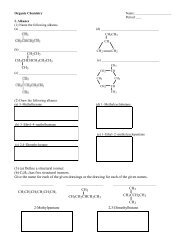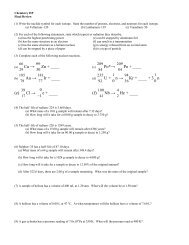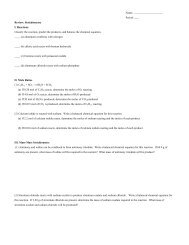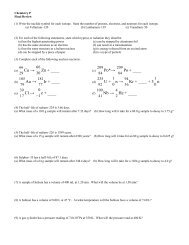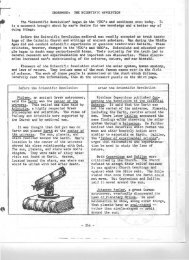- They had no real moral qualms about this b/c slavery had been practiced in Europe for centuries andEuropean Christians believed that it was OK to enslave “heathen” people. Racism against Africans, whichviewed them as inferior b/c of their skin color, had also been developing in England since the 1500s.- Even though there was a slave system in the West Indies by the 1650s, it didn’t spread to the mainlandcolonies until the 70s. Anyhow, when slavery did start in the colonies, what was it like? Slavery in the South – after 1677 slaves were imported incredibly rapidly into theChesapeake region, and the existing slaves multiplied even faster. As the slave populationincreased, laws against them became stricter [whites were scared]. The new slaves weregenerally assigned more remote posts until they learned local customs, etc. An important thingto remember about slavery in the South is that most yeomen farmers couldn’t afford slaves – itwas only the big planters that had them. So slavery also caused increased stratification inSouthern society. In the Carolinas there had been more slaves from the start, but they onlystarted importing them directly in 1700, when rice was introduced [the slaves helped themlearn to cultivate it]. Indigo was later added as a crop there. Carolinians also enslaved Indians,which contributed to the outbreak of the Yamasee War in 1715. Slavery in the North – in the North there were fewer slaves, most of who were concentratedin New York and New Jersey. Most slaves were also already assimilated Creoles, especiallyearly on. When some slaves did begin to <strong>com</strong>e from Africa, the Creoles didn’t like it and lookeddown on them b/c they had difficulty adapting. Though some slaves were house slaves orworked in cities, overall, like in the South, most Northern slaves lived in the countryside.*Atlantic Trade Patterns – “Triangular Trade”*- The <strong>com</strong>plex Atlantic trading system that developed as a result of the slave trade during the colonial periodis often referred to as Triangular Trade – but it really wasn’t a triangle at all. One thing is for sure, though:the whole thing really did depend on slavery – the sale and transport of slaves, the exchange of stuff theymade, and the food required to feed them.- Here is the classic triangular pattern, which developed in the mid 17th century… New England only had one thing England wanted – trees. So, to get more stuff from England,the colonists sold food to the English islands, which needed to feed their slaves. So by the1640s, New England was already indirectly dependent on slave consumption. The islands would consume products from New England and then ship molasses, fruit, spicesand slaves back to colonial ports, where the molasses would be distilled into rum and sent to…Africa, which would provide slaves, who would be sold by coastal rulers and bought byEuropean slavers, in exchange for the rum and manufactured goods.- Anyhow, in addition to the relationships above, there was a whole bunch of confusing stuff going on, but itis really not that big a deal so who cares?*Effects of the Slave Trade*- First of all, slavery definitely stunk for the slaves, who had horrible conditions on the boat ride, etc. But italso had major political and economic consequences for Africa and for Europe, where it sparked big timerivalries between the powers. This, of course, caused changes in the <strong>Am</strong>ericas. So here goes…- In West Africa, where the coastal rulers served as the essential link between the Europeans and theslaves, slavery caused increased centralization b/c the trade created powerful kingdoms. Slavery alsoconsequently destroyed existing trading patterns and hurt local manufacturing.- But the slave trade really benefited the Europeans, though it did help out some African rulers – so thepowers fought to control it. The Dutch replaced the Portuguese in the 1630s, and the Dutch then lost out tothe English, who took over through the Royal African Company in 1672. Even the English monopoly didn’treally last though, b/c by the 1700s most trading was carried out by independent traders.- B/c of the <strong>com</strong>petition over the slave trade, the English also looked for new sources of revenue, especiallyb/c of the Civil War. And they looked to – yup, you got it – the colonies.*Mercantilism and the Navigation Acts*- The mercantilist system of thought arose in the early 1600s, when it was believed that there was a finiteamount of wealth [if they win, you lose] in the world and that governments had to control production and<strong>com</strong>petition in order to gain the upper hand.- By the late 1600s the concept developed that colonies could actually extend the amount of wealth availableand that countries should exploit [I mean, use] their colonies to provide cheap labor and raw materials,which could be processed and then sold back to the colonies at a profit.6
- So in England, where they were looking for new sources of revenue, this sort of thinking was applied,resulting in the Navigation Acts, which were passed from 1651 to 1673, and stated that… All goods had to stop in England to check that [initially] _ the crew was British [later the quotawas raised to _, and the ships became taxed as well]. Foreign trading was banned between colonial ports, and colonists weren’t allowed to serve on<strong>com</strong>petitors’ ships. Later on lists of enumerated goods [goods that could only be sold to England] were made.- The purpose was to make England benefit from both colonial imports and exports. But, officials soon foundout that enforcing the laws was much easier than passing them, b/c there was lots of smuggling. As a result,Admiralty Courts were established and a Board of Trade and Plantations was formed in 1696 to supervisethe governors [but it didn’t have any direct powers of enforcement either].*Colonial Political Development and Imperial Reorganization*- After the crises of the 1670s, English officials began paying more attention tot the colonies. It was a realmess, administratively – the specifics were all different. Overall, though, the colonies all had governors[councils helped the governors] and legislatures [some of which were two-house].- So, even though the local institutions varied, colonists everywhere were used to some political autonomy.But, after James II became king, officials decided to clean up the mess and consolidate the colonies underBritish rule. Massachusetts (1691), New Jersey (1702) and the Carolinas (1729) were made royal colonies.- Some charters were temporarily suspended and then restored in that area as well. But the big changeswere made in Puritan New England, which was considered a smuggling hotbed and was changed into theDominion of New England in 1686 [New Jersey to Maine]. The Dominion was run by Sir Edmund Andros,who had immense power, until the Glorious Revolution in 1688.- After the GR, colonists thought – hey, let’s rebel too – so they jailed Andros and declared their loyalty toWilliam and Mary. But W&M also wanted tighter control, so they didn’t give the rebellions their sanction andinstead issued new charters, which destroyed many New England traditions.- To make it worse for New England, they had to fight King William’s War against the French and theirIndian allies [really a European war – The War of the League of Augsburg – in which France declared waron England b/c of the GR] from 1689 to 1697.- All the upheaval contributed to the famous 1692 Witchcraft Trials, where people were executed b/c ofaccusations of practicing witchcraft. These ended b/c: (1) ministers started to disapprove (2) the royalcharter was implemented and (3) people in high places were accused.- After the Witchcraft thing people settled down w/the new administration, though many resented the neworder. Another war, the War of Spanish Succession [Queen Anne’s War in the colonies] was fought, andcolonists were encouraged to help out through promises of land grants and offices.Colonial Development in the Eighteenth Century (1720 –1770)*Trends in Colonial Development in the Eighteenth Century*- Colonial development in the 18th century had several key aspects – population growth [mainly due tonatural increase], ethnic diversity, the increasing importance of cities, the creation an urban elite, risinglevels of consumption and the growth of a stronger internal economy.- So, by the second half of the century, social and economic stratification had increased significantly.Additionally, by that time, much of North <strong>Am</strong>erica had fallen under European control. These changes, alongwith new trends in thought such as the Enlightenment and the Great Awakening, transformed the colonies.*Intellectual Trends: The Enlightenment*- Throughout the 18th century a new colonial elite was developing, and one of the things that beganseparating them from most other people was education, their use of “leisure” time, and their knowledge ofthe European intellectual movement known as The Enlightenment, which stressed a belief in rationality andpeoples’ ability to understand the universe through mathematical or natural laws.- The Enlightenment also gave the elite a <strong>com</strong>mon vocabulary and subjects to discuss, and it alsoencouraged colleges in the <strong>Am</strong>ericas to broaden their curriculums to include subjects like science, law andmedicine, which allowed more people to join the educated circles.- Enlightenment ideals about government, illustrated by John Locke’s Two Treatises of Government (1691),which stated that men had power over their governments and attacked the theory of divine right, were alsodiscussed by the upper classes and did have an effect on <strong>Am</strong>erican political life.- To most people, however, the Enlightenment had its greatest effect though the advances in medicine itstimulated, such as the treatment of smallpox through inoculation.7
- Page 3 and 4: Congregationalists (Puritans) - The
- Page 5: - So the Restoration Colonies, form
- Page 9 and 10: *Colonial Politics 1700-1750: Relat
- Page 11 and 12: - Another ideology that was beginni
- Page 13 and 14: - The Quebec Acts were passed aroun
- Page 15 and 16: - So, by 1782, what had seemed to b
- Page 17 and 18: on the economic side, since the gov
- Page 19 and 20: - Anyway, Congress had several ques
- Page 21 and 22: - Adams was still in the early Wash
- Page 23 and 24: *Political Factionalism and Jeffers
- Page 25 and 26: - Samuel Slater set up the first te
- Page 27 and 28: - Court rulings extended the powers
- Page 29 and 30: Revival, Reform and Politics during
- Page 31 and 32: - Anyhow, during his administration
- Page 33 and 34: TEXAS (Southerners) - Texas had bee
- Page 35 and 36: - Anyhow, Pierce’s total support
- Page 37 and 38: They had a smaller everything: smal
- Page 39 and 40: - The two Northern victories at the
- Page 41 and 42: - The result was the Fourteenth Ame
- Page 43 and 44: The Slaughter-House Cases (1873) -
- Page 45 and 46: in the arrest of 8 immigrant radica
- Page 47 and 48: case (1897 - ICC can’t set rates)
- Page 49 and 50: - The Populists prepared to run aga
- Page 51 and 52: - MOST IMPORTANTLY, though, was the
- Page 53 and 54: - So, what led the US to undertake
- Page 55 and 56: - The rebellion, led by Emilio Agui
- Page 57 and 58:
- Still, Americans managed to turn
- Page 59 and 60:
- So - the point of this episode? B
- Page 62 and 63:
*Hoover’s Response*- Poor Herbert
- Page 64 and 65:
- In FDR’s second term, however,
- Page 66 and 67:
Dominican Republic - When we left i
- Page 68 and 69:
World War II (1941 - 1945)*The Cour
- Page 70 and 71:
- So Truman started off again all c
- Page 72 and 73:
- First of all, the 1950s were (for
- Page 74 and 75:
peace w/Japan that ended occupation
- Page 76:
- France wanted out, so at the Gene





